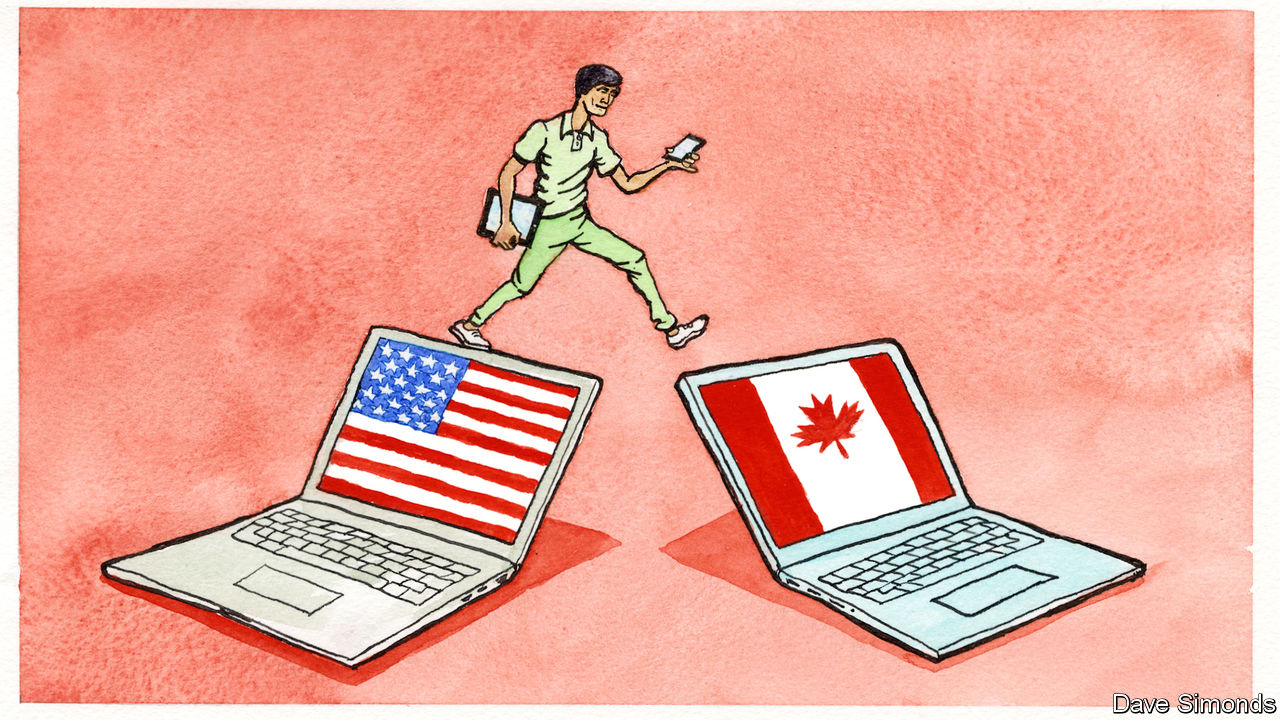As immigrant techies shun the US, its neighbour has rolled out the red carpet

induce a software developer to quit a good job in Silicon Valley and trade California’s sunshine for Toronto’s wintry skies? For Vikram Rangnekar, born in India and educated in America, the triggers were the restrictions placed on immigrant tech workers holding an h-1b visa (starting companies or taking long holidays is discouraged) and what looked like a 20-year wait to get the green card he needed in order to settle down. Rising anti-immigrant sentiment under President Donald Trump’s administration did not help. Two years later he thinks he made the right choice. “I didn’t want to spend the best years of my life on a restrictive visa.”
People like Mr Rangnekar are part of an exodus of tech workers from Silicon Valley. Pushed out by the cost of living as well as by a less welcoming American government, they are being pulled in by countries such as Canada, where tech vacancies are forecast to reach 200,000 by 2020. Canada is gambling that by the time America wakes up to the cost of discouraging immigrants its tech sector will have secured some of the best talent.
The starting-point is pretty promising. Toronto already has expertise in artificial intelligence (ai) and an array of promising firms such as Wattpad, a storytelling platform with 65m readers. The city added more tech jobs in 2017 than the San Francisco Bay area, Seattle and Washington, dc, combined. Ottawa is home to Shopify, a publicly traded e-commerce platform valued at C$19bn ($14bn). Montreal, another ai hotbed, has Element ai, a lab co-founded by Yoshua Bengio, a specialist in deep learning—and newish labs opened by Facebook and Samsung.
Yet Canada is in the third tier of destinations globally, says a study on venture-capital investment, “The Rise of the Global Start-Up City”, co-authored by Richard Florida, an urbanologist. To move up, the government has tweaked both its permanent and temporary immigrant programmes. Applicants for permanent residence get extra points for tech skills. Temporary visa holders are told their spouses will be allowed to work. Justin Trudeau, the prime minister, often underlines that in multicultural Canada, diversity is welcomed. Publicly funded health care sometimes gets a mention. “All of this is designed to pivot Canada away from the nativist policies of Trump,” says Ravi Jain, a Toronto immigration lawyer who has many tech clients.
Such tactics seem to be working, especially with Indians, a mighty force in Silicon Valley, where they form the largest group of immigrant tech workers. Indians from America and elsewhere snapped up almost half of the new temporary visas (processing time: two weeks) that Canada began issuing in June 2017 at the behest of the tech industry. The number of Indian nationals taking the slightly longer route to permanent residency surged between 2016 and 2017—up by 83% for those who entered under a federal skills programme, up by 122% for those selected by provinces to fill specific vacancies, and up by a whopping 538% for those who entered based on work experience. “I can clearly see the reason why people are shifting to us,” says Allen Lau, the chief executive of Wattpad. “The us is becoming less friendly.”
Still, the government knows it cannot be complacent, says Ahmed Hussen, minister of immigration, refugees and citizenship. It has set up research chairs at universities, overhauled support programmes and in its most recent budget earmarked C$2.5bn over five years in direct industry funding for innovation. It is one thing for Canada to attract disaffected immigrant tech workers from Silicon Valley. Now Maple Valley, as some call it, must make it worth their while to stay.
No comments:
Post a Comment
Note: Only a member of this blog may post a comment.